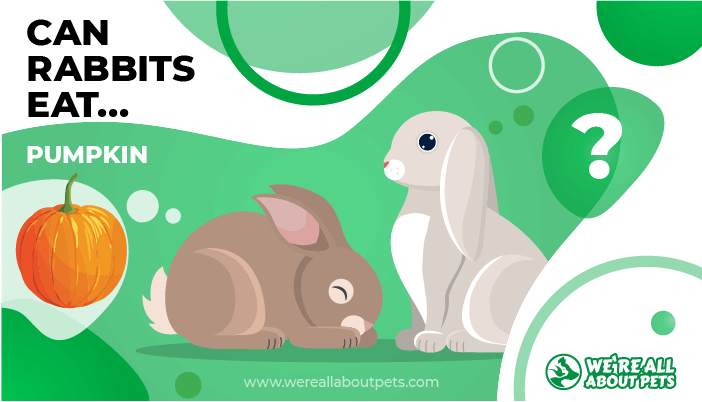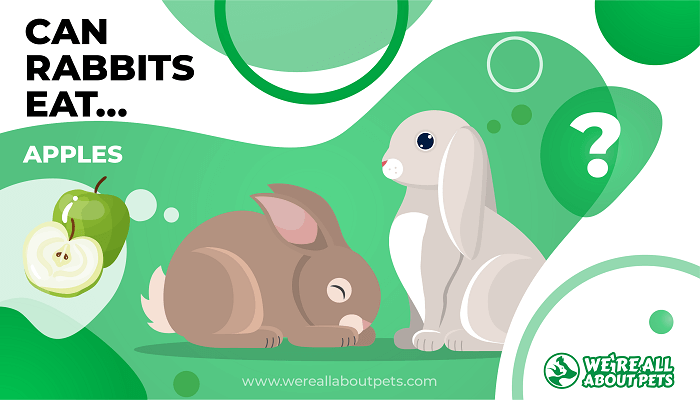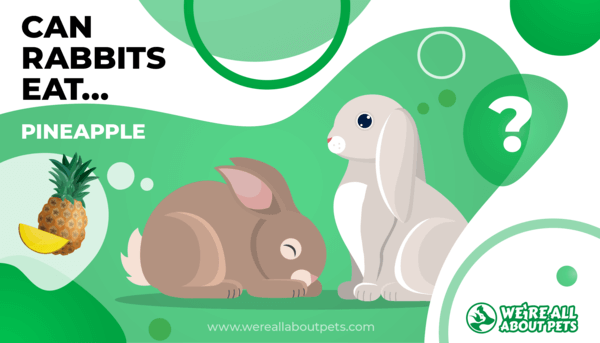Can Rabbits Eat Grass?
This page contains affiliate links. We may earn money or products from the companies mentioned in this post through our independently chosen links, which earn us a commission. Learn More
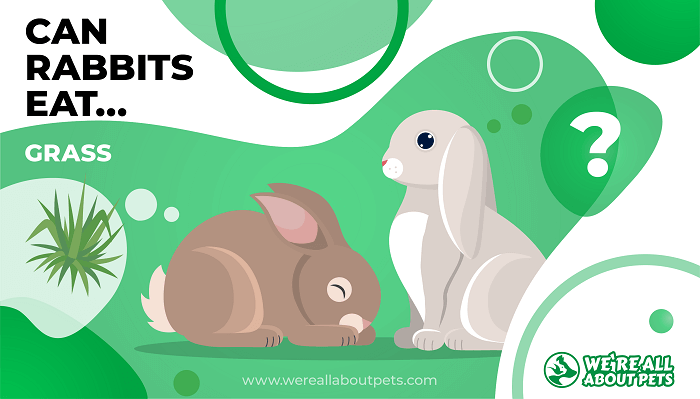
Can rabbits eat grass? As a bunny parent, you want to do what’s best for your little friend. After all, rabbits have sensitive digestive systems.
In case you’re looking for a quick answer to the question of whether grass is okay for rabbits, it’s an enthusiastic yes!
Hold on though, because there are some things you need to know before you feed grass to your rabbit friend. Stick with us, because you’re about to learn everything there is to know about grass for rabbits.
Can Rabbits Have Grass?
Yes! In fact, grass is the cornerstone of a wild rabbit’s natural diet. You will have to be careful about selecting grass to give your rabbit, since landscapers and property owners often use chemicals to maintain smooth, green lawns.
Only give your rabbit grass from a source that you’re sure is safe. If you have even the slightest suspicion that chemical fertilizers, herbicides, or pesticides have been used on the grass you are considering for your rabbit, choose a different source.
There’s one more thing to watch out for when deciding where to pick grass for your rabbit. The absolutely certain that other pets haven’t used that area as a toilet. Fresh grass is okay for bunnies, but only if it’s clean.
Is Grass Good For Rabbits?
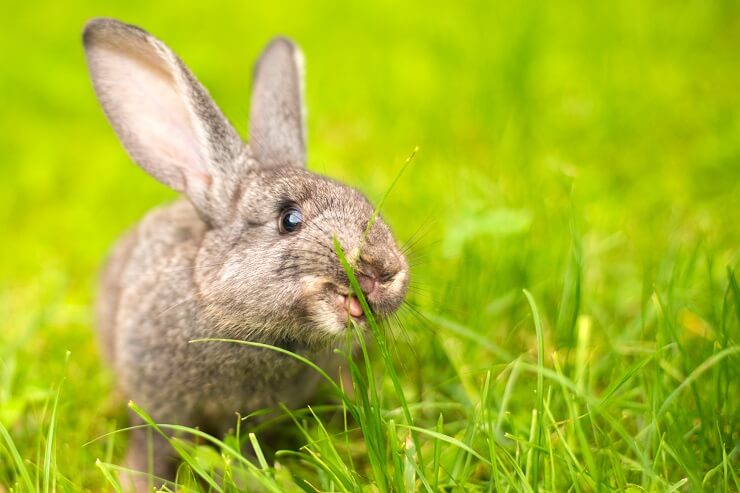
Even though you’ll want to be careful about sourcing grass for your rabbit, untreated grass can be an excellent source of nutrients. In addition, grass has long fibers that keep your rabbit’s digestive system running smoothly.
Do Rabbits Like Grass?
Absolutely! Rabbits are naturally drawn to grass and other small plants that grow close to the ground! Things we humans consider to be weeds – dandelions for instance – are among a rabbit’s favorite natural foods.
How Much Grass Can A Rabbit Eat?
Grass is all natural, so is there such a thing as too much? That’s a definite yes:
Here’s how much grass a to feed your rabbit:
| Age | Amount |
| Baby rabbit | Tiny pinch to start; gradually work up to a few handfuls or a little time nibbling outdoors. |
| Adult rabbit | Tiny handful to start; gradually work up to several handfuls or a little time nibbling outdoors. |
If your rabbit has been eating a diet that consists mostly of hay and other dry foods, then you’ll find that grass offers an ideal introduction to fresh foods.
Since sudden changes can upset the flora in your rabbits digestive system, it’s very important to introduce grass slowly. Start with a tiny handful of grass and gradually increase your bunnies serving size.
Even though grass isn’t likely to lead to diarrhea, you should keep an eye on your bunny’s stools for about 24 hours after their first introduction to fresh, green grass, just to be sure that there aren’t any problems.
So long as everything is normal, you can keep on increasing the amount of grass you rabbit eats.
How Often Can A Rabbit Eat Grass?
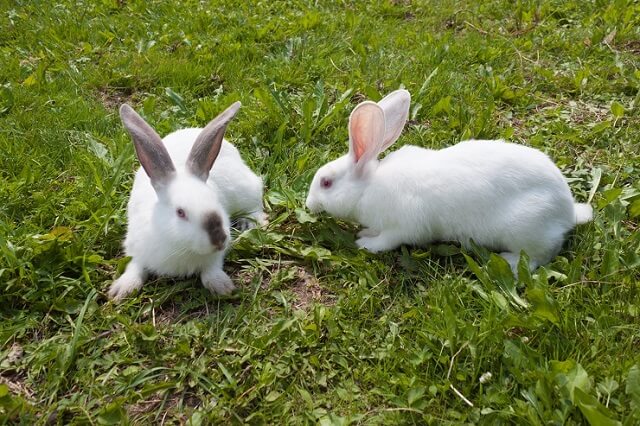
Once your bunny becomes accustomed to grass, they can have some every day. If you have a safe place to allow your bunny to spend time outdoors, you can let them nibble grass on their own without having to pick it or cut it with scissors.
Remember to supervise your rabbit if you decide to let them eat outside..
The Correct Diet Is Important
Besides grass, what else should a rabbit eat? In the wild, rabbits enjoy a wide variety of plants that grow within easy reach and it’s likely that your bunny will get some of these if they’re allowed to nibble on their own outdoors.
Here’s our quick guide to feeding a rabbit:
- Unlimited fresh hay, which replaces the grass wild rabbits eat, and which helps keep your bunny’s teeth from becoming overgrown. Grass from outdoors shouldn’t replace the hay in your rabbit’s diet.
- A daily helping of nutritionally complete rabbit pellets; check the package for the correct serving size since it often varies by brand.
- One tablespoon of pumpkin seeds, pepitas, and/or sunflower seeds without added salt. Feel free to skip this addition if there are already seeds in your rabbit’s food.
- One cup of leafy greens and crunchy veggies per two pounds of your rabbit’s body weight; remember to offer different kinds of greens each day to prevent oxalates and calcium from binding together to form kidney stones.
- Natural treats such as small amounts of fruit and little nibbles of colorful vegetables; always remember to check for the correct serving size, particularly when offering sweet fruits. As a general guideline, rabbits should only have about 1 teaspoon of fruit per two pounds of body weight per day.
- Clean, fresh water; unlimited amount: Be sure to rinse and refill your rabbit’s drinking bottle at least once a day.
Last but not least, it’s important to take care of your rabbit’s dental health. A rabbits teeth never stop growing and it’s up to you to provide your bunny with safe, chewable items to help keep their teeth worn to the correct length.
Rabbit toys are lots of fun, and so are things like softwood sticks, unbleached loofah, and coconut shells.
What Are Other Healthy Alternatives To Grass In A Rabbit’s Diet?
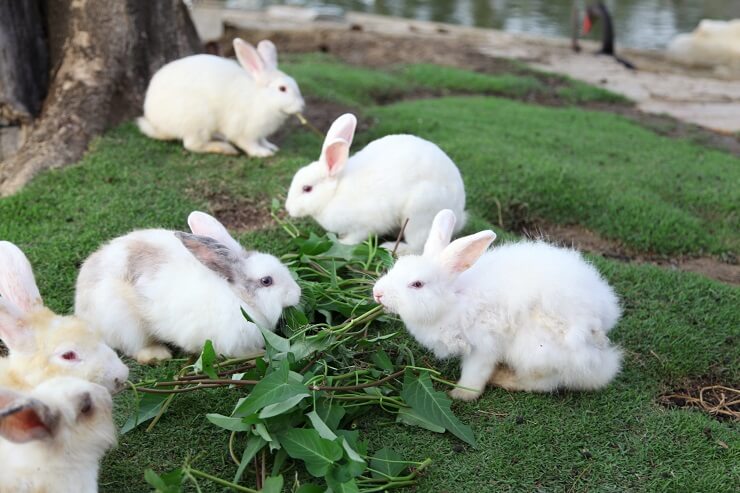
Even though your rabbit can eat plenty of grass once they’re accustomed to it, it’s important to offer them a diet with plenty of variety.
Here’s a list of veggies rabbits like to help you get started:
- baby corn
- artichoke
- sweet corn
- cabbage
- swiss chard
- grass
- endive
- escarole
- beets
- beet tops
- radish
- basil
- cilantro
- asparagus
- mint
- parsley
- carrot
- carrot tops
- romaine
- arugula
- butter lettuce
- bibb lettuce
- bell pepper
- watercress
- okra
- celery
- rocket
- tomato
- broccoli
- broccolini
- zucchini
- buttercrunch lettuce
- green beans
- cucumber
- summer squash
- winter squash
- pumpkin
- parsnip
- bok choy
- yu choy
Even though most veggies are okay for rabbits some common foods are toxic. This means it’s very important to spend a few minutes checking to see whether new foods are safe for your bunny.
Besides checking into safety, look for information about correct serving sizes. Some foods can harm your rabbit if overeaten.
Now that you know all about grass for rabbits, it’s time to have some fun! Snip a little bit of fresh, clean grass and offer it to your bunny. They’ll appreciate this tasty, natural treat.
Frequently Asked Questions
Is grass safe for rabbits?
Yes! It's safe to give grass to rabbits so long as no chemicals were used on the grass, and so long as no other animals have used it as a toilet.
Can grass make my rabbit sick?
Yes, unfortunately grass can make your rabbit sick if it has been treated with chemicals or if it is soiled.
Can rabbits eat lawn clippings?
No, lawn clippings are not safe for rabbits. Lawn clippings quickly become fermented after cutting and fermented items can lead to serious bloating, stomach pain, and diarrhea. Never give your rabbit lawn clippings.
Can I grow grass for my rabbit?
Yes! You can grow grass indoors using a pet grass kit, or you can cultivate a patch of fresh green grass outside just for your bunny.






